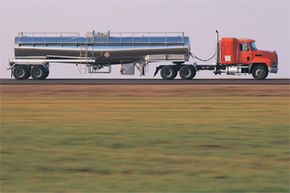Horses, cowboy hats, cattle and dust: These are the things that likely come to mind when you think of ranches. As strange as it may sound, you might want to add "oil" to that list. Ranchers and farmers depend heavily on different oil products, including machine oil, heating oil and motor oil, often keeping oil storage tanks on their property. In fact, 8 percent of U.S. farms and ranches keep enough oil on hand to be regulated under the U.S. Environmental Protection Agency's (EPA) Spill Prevention, Control and Countermeasure plan [source: EPA]. Add in ranchers' need for gasoline and diesel fuel, and you can understand why oil and fuel tanker trucks are a common sight out on the range.
Like everyone else, ranchers and farmers are very sensitive to the price of oil, but because they use so much, rising oil prices can quickly eat into their profits. Just ask the Madsen family, which farms around 10,000 acres (4,047 hectares) in South Dakota. In the process, the Madsens may go through up to 2,000 gallons (7,571 liters) of fuel a day, costing them more than $100,000 over the course of a year [source: Miller]. Families like the Madsens purchase fuel in bulk, not only to save money but also for convenience. Because tank trucks typically carry between 5,000 and 9,000 gallons (18,927 and 34,069 liters) of fuel, a farm like the Madsens' would require fuel deliveries every few days.
Advertisement
Of course, not all tanker trucks are welcome on ranches and farms. That's because ranches and farmland often sit on massive oil reserves, and oil companies' tanker trucks are constantly collecting oil from their network of wells. Since many ranchers don't own mineral rights to their land, they don't see a penny of the oil money. Those ranchers aren't pleased to hear the rumble of such trucks as they make their way around the ranch.
In addition, as oil prices rise, reserves that were once considered too expensive to tap are suddenly bustling with activity, and so are the ranches and farms under which they sit. Take, for instance, the oil reserve known as the Bakken, which is located on the border of North Dakota and Montana. The number of oil wells in North Dakota nearly quadrupled over the course of 2008 as oil companies ramped up drilling operations in the area. In addition, the state expects to have 12,000 oil workers by 2010, meaning tanker trucks will be an increasingly common sight for area farmers and ranchers [source: Davey].
But are these trucks really anything more than a nuisance? Read on to find out.
Advertisement

